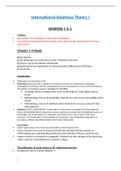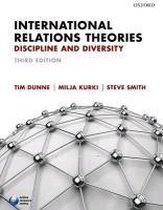International Relations Theory I
SESSIONS 1 & 2
Syllabus:
Introduction: The Discipline of International Relations
How did International Relations emerge, what does it study, and what are the main
approaches?
Chapter 1 of Book:
●Introduction
● The philosophy of social science in IR: a historical overview
● Science, the fourth debate and beyond
● Exploring the key implications of meta-theoretical differences in IR theory
● Conclusion
Introduction
Philosophy of social science in IR
Meta-theory does not take a specific as its object of analysis, but explores the underlying
assumptions of all theory and the consequences of such assumptions on the act of theorizing and
the practice of empirical research. THEORIES OF THEORIES
Ontology: theory of being: what is the world made of? what objects do we
study?
Epistemology: theory of knowledge: how do we come to have knowledge of the
world?
Methodology: theory of methods: what methods do we use to unearth data
and evidence?
Positivism: FACTS and EVIDENCE. A philosophy of science that is founded on (1) the empiricist
theory of knowledge (which argues that sensory experience provides the only legitimate source of
knowledge); (2) an assumption of ‘naturalism’ (the belief in the unity of natural and social
sciences); and (3) the belief in the possibility of making fact–value distinctions (separation of
normative, political, and ethical beliefs from ‘factual’ statements).
This chapter:
Argues against the need of only facts and evidence in the debates of IR.
points towards new ways of science from the last decade hold the promise of
reformulating our understanding of the aims and methods of IR as a social science.
Argues science is not based on a dogmatic insistence on the certainty of its claims but,
rather, rests on a commitment to constant critique.
The philosophy of social science in IR: a historical overview
Its history in terms of great debates: 4
1
, First great debate:
Realists vs. idealists. Before, during, and immediately after the Second World War.
Over the role of international institutions and the likelihood that the causes of war
might be ameliorated.
The idealists were driven by a desire to develop a set of institutions, procedures, and
practices that could eradicate, or at least control, war in the international system.
Cohered in Woodrow Wilson’s Fourteen-point Plan for a new postwar order. Also
introduced the idea of an academic discipline constructed to study the international
politics. Aim: production of a body of knowledge that could be used in the furtherance
of peace. Scientific method, reason.
Realists accused the idealists of focusing their attention on how the world ‘ought’ to
be, as opposed to dealing with how it objectively was.
Morgenthau objected to any attempt to construct a science of international politics
modelled on the natural sciences. After all, if international politics was governed by
‘objective laws’ rooted in human nature, then the true causes of war were to be found
in biology, and any nascent science of IR could provide only suggestions for dealing
with a realm of human activity that was to a great extent predetermined.
Morgenthau did not want to provide a series of in-depth explanations of the workings
of the world. Instead, a series of techniques and modes of operation for dealing with a
world on the basis of a simple, but enticing, explanation.
Second great debate:
1960s. Traditionalists, defended a more humanistic methodology, against the
modernizers, wanted greater level of methodological rigour to the discipline.
Behaviorist revolution in social sciences: school of thought that, drawing on empiricist
theory of knowledge and positivist philosophy of science, seeks to study human
behaviour in reference to observable and measurable behavioural patterns. New
‘scientific’ IR scholars, such as David Singer and Morton Kaplan. Enthusiasts of
positivism. Many of the core concepts of ‘classical’ realism were deemed to be lacking
in specificity and were not susceptible to measurement. Most modernists were in the
US.
For traditionalists systematic inquiry was one thing, the obsession with data collection
and manipulation on positivist lines was another. For them conceptual and
interpretative judgements was essential.
Third great debate
1970s and 1980s. focused on disagreements among the realist, pluralist, and Marxist
perspectives on how best to understand and explain international processes.
Interparadigm debate moved IR away from the ‘methodological’ issues of the 1960s.
Despite the consensus on science, however, issues surrounding the nature of scientific
inquiry quickly resurfaced; in particular, the problem of theory choice and the alleged
incommensurability (the mutually exclusive nature of theoretical views of the world by
realist, pluralist, and globalist approaches) of differing theoretical perspectives.
In this sense Thomas Kuhn argued that the different views were not efficient in
expanding knowledge, rather, they used energy to gain theoretical dominance.
2
, Knowledge could only progress, in periods of what Kuhn called normal science. In an
era of normal science one theoretical school, or what Kuhn called a paradigm, would
dominate. In such periods knowledge could progress because everyone was in
agreement on the validity of the chosen paradigm and hence the vast majority of
scholars were working in a particular subject using agreed methods and techniques
and could compare their findings.
This method, enthusiastically embraced by the discipline. But disagreement on key
issues remained. Moreover, despite the disagreements between them, the realists and
behaviouralists had suggested that progress could be achieved only by adopting a
more scientific mode of study. Kuhn’s model suggested a different, more conservative,
conclusion.
In the mid-1970s three paradigms vied for theoretical dominance; realism, Marxism,
and pluralism. And no solution was achieved to unite the 3.
The fourth debate and beyond
Emerged mid-1980s. Disagreements about what the discipline should study and how it
should study it. If IR should or not be form of inquiry based upon scientific principles.
A debate between explaining and understanding, between positivism and
postpositivism, or between rationalism and reflectivism .
Explaining and understanding: a distinction made by Max Weber and introduced into
IR theory by Hollis and Smith (1990). ‘Explanatory’ theories seek to emulate natural
sciences and explain general causes, while ‘understanding’ approaches aim to account
for agents’ actions ‘from within’ through interpreting actors’ meanings, beliefs, and
reasons for action
Postpositivism: an umbrella term for a number of approaches that criticize positivist
approaches to knowledge generation. Postpositivists can be seen to include a
heterogeneous group of theorists critical of the positivist approach to studying world
politics, such as interpretive/hermeneutic theorists, poststructuralists, feminists,
critical theorists, scientific/critical realists, and some, although not all, constructivists.
Empiricism a theory of knowledge (an epistemology) that holds that knowledge should
be grounded in empirical experience. Empiricist epistemology has been infl uential in
informing positivist philosophies of science and is often seen to underlie positivist
theories in IR theory.
Characteristics of positivists.
For positivists science must be focused on systematic observation to produce a
set of logically rigorous guidelines concerning appropriate methodological
techniques and criteria for ensuring that knowledge claims are grounded in
appropriate observations.
All positivists believe that the collection of sufficient data, generated through
repeated instances of observation, will reveal regularities, which are indicative
of the operation of general laws
3
, Causal relations are discovered through the detection of regular patterns of
observable behavior.
Any attempt to introduce non-observable processes, mechanisms, and events
as explanations of the data are considered inadmissible.
Rationalism: form of theorizing that utilizes rational choice explanation in its
explanatory framework. Keohane (1988) used this term to highlight the similarities
between the neorealist and neoliberal theorists, who shared with each other the
assumption of rationality and, further, tended to apply the rules of the positivist model
of science in their research.
The approach is deductive because it begins with a theory of the individual and then
utilizes observation and hypothesis testing to substantiate, or falsify, a set of claims
relating to behaviour on the basis of this view.
The rational choice theorist accepts the general complexity of the social world but
ignores the majority of it in order to produce predictions based on a particular
understanding of individuals. According to rational choice theorists we should treat
individuals, and by extension states, as utility maximizers, and ignore every other
aspect of their social being.
Reflectivism: a term used initially by Robert Keohane (1988) to refer to theorists that
reject the rational choice methods and the positivist approach to knowledge
generation of the ‘rationalist theorists’ in the study of world politics. Reflectivism is
often interpreted to incorporate various ‘postpositivist’ schools such as feminism,
critical theory, but especially poststructuralism.
They were told they could be taken seriously only when they developed a ‘research
programme’. This was a direct challenge to the new theories to move beyond criticism
of the mainstream and demonstrate, through substantive research, the validity of their
claims.
The mainstream has been reluctant to take the knowledge claims of refl ectivist
scholars seriously, because they challenge the very status of the ontological,
epistemological, and methodological assumptions upon which the mainstream
depend.
Scientific and critical realism
Positivism challenged by scientific realism.
Scientific realism; philosophy of science that aims to overcome the limitations of the
positivist philosophy of science. The key assumption that informs scientific realism, and
its close associate ‘critical realism’, is the belief in the independent existence of reality
(however not in accordance with ‘epistemic realism’ of the positivists). Scientific and
critical realists advocate deep ontological inquiry through conceptualization and
epistemological and methodological pluralism.
Methodologically, it follows that scientific realists adopt a pluralist approach: contrary
to the positivist emphasis on quantitative methods and the interpretive emphasis on
qualitative methods, scientifi c realists emphasize methodological pluralism.
4





